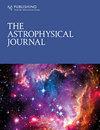Calibrating VLBI Polarization Data Using GPCAL. I. Frequency-dependent Calibration
IF 5.4
2区 物理与天体物理
Q1 ASTRONOMY & ASTROPHYSICS
引用次数: 1
Abstract
Abstract In this series of papers, we present new methods of frequency- and time-dependent instrumental polarization calibration for very long baseline interferometry (VLBI). In most existing calibration tools and pipelines, it has been assumed that instrumental polarization is constant over frequency within the instrument bandwidth and over time. The assumption is not always true and may prevent an accurate calibration, which can result in degradation of the quality of linear polarization images. In this paper, we present a method of frequency-dependent instrumental polarization calibration that is implemented in GPCAL, a recently developed polarization calibration pipeline. The method is tested using simulated data sets generated from real Very Long Baseline Array (VLBA) data. We present the results of applying the method to real VLBA data sets observed at 15 and 43 GHz. We were able to eliminate significant variability in cross-hand visibilities over frequency that is caused by frequency-dependent instrumental polarization. As a result of the calibration, linear polarization images were slightly to modestly improved as compared to those obtained without frequency-dependent instrumental polarization calibration. We discuss the reason for the minor impact of frequency-dependent instrumental polarization calibration on existing VLBA data sets and prospects for applying the method to future VLBI data sets, which are expected to provide very large bandwidths.用GPCAL标定VLBI偏振数据。1 .频率相关校准
在这一系列的论文中,我们提出了用于甚长基线干涉测量(VLBI)的频率和时间相关仪器偏振校准的新方法。在大多数现有的校准工具和管道中,假设仪器极化在仪器带宽和时间内随频率恒定。该假设并不总是正确的,并且可能妨碍准确的校准,这可能导致线偏振图像质量的下降。在本文中,我们提出了一种基于频率的仪器偏振校准方法,该方法在最近开发的偏振校准管道GPCAL中实现。该方法使用由实际甚长基线阵列(VLBA)数据生成的模拟数据集进行了测试。我们给出了将该方法应用于15 GHz和43 GHz实际VLBA数据集的结果。我们能够消除由频率相关的仪器极化引起的交叉手可见度的显著变化。校准的结果是,与没有频率相关的仪器偏振校准获得的图像相比,线性偏振图像略有改善。我们讨论了频率相关仪器极化校准对现有VLBA数据集影响较小的原因,以及将该方法应用于未来VLBI数据集的前景,这些数据集有望提供非常大的带宽。
本文章由计算机程序翻译,如有差异,请以英文原文为准。
求助全文
约1分钟内获得全文
求助全文
来源期刊

Astrophysical Journal
地学天文-天文与天体物理
CiteScore
8.40
自引率
30.60%
发文量
2854
审稿时长
1 months
期刊介绍:
The Astrophysical Journal is the foremost research journal in the world devoted to recent developments, discoveries, and theories in astronomy and astrophysics.
 求助内容:
求助内容: 应助结果提醒方式:
应助结果提醒方式:


